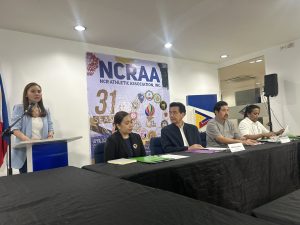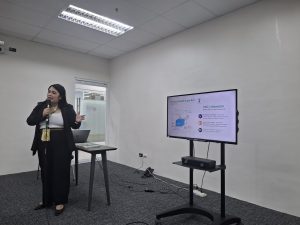Workers within the Subic Bay Freeport Zone (SBFZ) no longer have to travel far to acquire a skills upgrade. All they need to do is report to work and apply for the training they need at their workplace.
This is in response to Pres. Ferdinand R. Marcos Jr.’s directive to expand Technical and Vocational Education and Training (TVET) in the Philippines. Under the Philippine Development Plan 2023-2028, the Technical Education and Skills Development Authority (TESDA) was mandated to strengthen TVET by incorporating Apprenticeship and Dual Training System as well as continuously training the unemployed.
This will involve enhancing and promoting enterprise and education-based training programs—such as dual training systems, apprenticeship, and learnership—and strengthening the Tulong Trabaho Act (RA 11230). This will be done to boost participation from the private sector, especially in manufacturing.
Under a Memorandum of Agreement between the Technical Education and Skills Development Authority (TESDA) and the Subic Bay Metropolitan Authority (SBMA), the latter will establish a training center within the Freeport Zone where employees can go for trainings.
This is in line with President Marcos’ directive to boost company-based skills training programs for Filipino workers in keeping with the recently signed Republic Act No. 12063, or the Enterprise-Based Education and Training (EBET) Framework Act. The President said the law will address training and skill mismatches and improve the country’s employment situation.
“In signing the EBET Framework Act into law, we lay a stronger foundation for a workforce that is agile, skilled, and ready to meet the demands of a rapidly evolving world,” President Marcos said.
President Marcos signed RA 12063 into law on November 7, 2024. It has no end date since this is a continuing program.
“By establishing a framework on career advancement and industry-relevant skills, this law directly addresses the issues on the lack of formal training and skill mismatches, ensuring that every Filipino can contribute and benefit from our nation’s growth,” he added.
Under RA 12063, firms that conduct apprenticeship, leadership, and dual-tech training programs can avail themselves of fiscal incentives, namely tax cuts ranging from 50 to 75 percent for actual training expenses, donations or financial aid, and tax exemptions.
“This targeted assistance will make it possible for even the smallest businesses to provide high-quality, industry-aligned training, empowering them to uplift their communities and the economy as a whole,” the President said.
The SBMA, responsible for overseeing the SBFZ, recognizes the crucial role of a skilled workforce in attracting investors and fostering economic growth. The freeport zone boasts a diverse range of industries, from manufacturing and logistics to tourism and information technology.
TESDA, the national agency responsible for vocational education and trainings, provides programs such as hands-on training, apprenticeships, and certifications recognized both nationally and internationally.
TESDA’s seminar workshops will center on agriculture, construction, automotive, and land transportation-related knowhow. It will be made available to those employed within the freeport zone, including workers who lost their jobs during the pandemic. The program will also be made available to indigenous peoples and other underserved sectors in need of skills development.
The collaboration is not only about providing trainings but rather directly addressing the employment needs of the SBFZ and the surrounding communities, thus creating a dynamic and sustainable workforce.
Annabel dela Cruz, a skilled worker, wants to grab the opportunity of the SBMA-TESDA partnership to equip her further with more skills and expertise. “Ako at ’yong iba pang kasamahan ko, willing talaga kami mag-join sa training. Pampaganda pa ng resume (I and my co-workers want to enlist with the training program, for additional skills and to make our resumes more attractive),” she said.
Annabel noted the fact that the program means they no longer need to spend on training fees or look for similar trainings elsewhere just to equip them with better skills.
The President said these kinds of training will help ensure that those who finish capacity-building trainings will find employment using the skills they learned.
“That is why it is very important to synchronize our skills trainings with the actual requirements of the industry and the labor market. That’s why the partnership between private and public is critical,” President Marcos said.
According to the MOA, Building 309 along Canal Road in the Freeport will be set aside for assessments and skills trainings, targeting potential workers who will complement the workforce requirements of industries inside the Freeport Zone. The two-story training facility has an area of 2,000 square meters.
Subic Bay Freeport has a workforce of more than 162,000 as of November 2024, working for some 1,900 domestic and foreign investors in SBMA.
The collaborative relationship between the SBMA and TESDA dates back to the SBMA’s efforts to transform Subic into a thriving industrial and commercial hub following the withdrawal of U.S. forces in the early 1990s. Over the years, TESDA has provided technical and vocational training for the SBMA’s workforce. The partnership has played a vital role in ensuring that the workforce in the SBFZ remains competitive and at par with industry standards.
SKILL-BASED SUCCESSES
A notable milestone in this collaboration was the establishment of Enterprise-Based Training (EBT) initiatives, which were formalized through Memorandums of Agreement (MOAs) with various businesses in the Freeport Zone, ensuring that training programs met the specific requirements of industries operating within Subic Bay.
EBT is recognized as an effective training model preferred by industries, offering learners practical, hands-on experience within actual work environments. The approach equipped participants with the necessary skills and competencies while actively contributing to production processes.
This was strengthened in 2024 when an industry forum was conducted to discuss the EBT. During the forum, representatives from diverse industries operating within the SBFZ participated, including major players such as Datian Subic Shoes, Inc., Mikuni Terminals Mechatronics Philippines Corporation, Sanyo Denki Philippines, Inc., and many others. These companies span sectors like footwear manufacturing, mechatronics, electronics, construction, and content creation services, to name a few.
The MOA stated that the SBMA shall provide the training venue or facility, including the cost of utilities, while TESDA shall ensure that qualified trainers and assessors, as well as appropriate tools, supplies, equipment, and materials, are available in the conduct of training and assessment. TESDA shall also provide free training and assessment and other related services through available scholarship programs. Both parties shall jointly implement minimum health protocols in the conduct of their activities. (Radyo Pilipinas)



